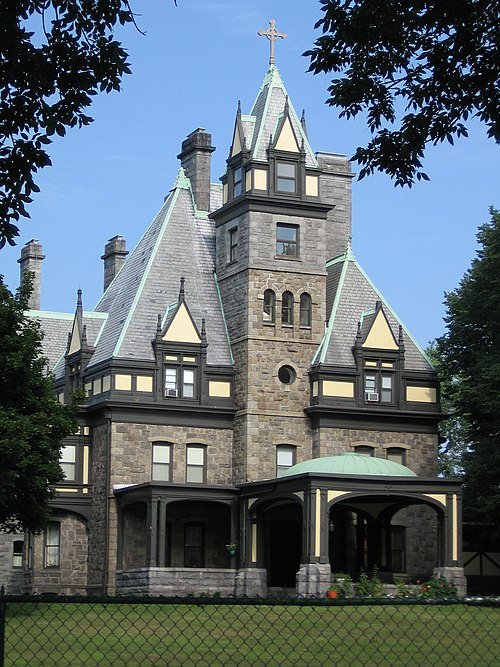David Warsh: Support Ukraine but study the path to war
"The Chateau" at St. Basil College, in Stamford, Conn., was originally a college dormitory and now houses the Ukrainian Museum and Library of Stamford.
SOMERVILLE, Mass.
I have lived with the possibility of war in Ukraine for a long time, first as a newspaper columnist, then as a newsletter writer (and a long-ago war correspondent). I wrote against further NATO enlargement soon after Poland, Czechoslovakia and Hungary were admitted – gingerly at first, more firmly once I began covering the Harvard-Russia scandal in the mid-’90s.
Boris Yeltsin’s selection of Vladimir Putin to be his successor didn’t seem surprising. Unlike Hillary Clinton, I was not shocked when, in 2012, Putin took back the helm from Dimitri Medvedev. Putin wasn’t a czar, but by then he was steering Russia’s course.
The events of 2014 did alarm me – Putin’s plans for a gradual takeover of Ukraine, foiled by US-supported demonstrations in Kyiv’s Maiden Square, followed by Russia’ stealth repossession of the Crimean peninsula. In 2016, expecting that Clinton would be elected, I began writing Because They Could: The Harvard-Russia Scandal (And NATO Expansion) after Twenty-five Years (Create Space, 2018)
Instead Donald Trump was elected. His longstanding relationship with Russian government and various Russians put the matter on hold. Joe Biden defeated Trump four years later and the momentum of NATO expansion was seamlessly reasserted, notably with signing on Nov. 10, 2021 of a U.S.-Ukraine Charter of Strategic Partnership. Barely three months later, Putin attempted his ill-fated blitzkrieg. The subsequent invasion was mostly turned back, except in the eastern Donbass region.
What’s done is done. The issue seems to me to have been decided, mostly by the citizens and soldiers of Ukraine. The U.S. may or may not bear responsibility for having fomented the war by pressing the boundaries – and the culture – of NATO ever closer to Russia, but having reached this point in Putin’s war on Ukraine, America has no honorable alternative but to stay the course until Putin stands down. He will do so only after more defeats on the battlefield; after taking account of the devastation he has caused, no less to his own country than to Ukraine; and to Russia’s reputation forever. His pursuit of restoration of Russian status as a superpower was a pipedream.
What is next? Partition is apparently what the Pentagon expects, once Russia’s spring offensive grinds to a halt. That makes sense to me. Russia gets to keep portions of Eastern Ukraine that it already possesses. Ukraine retains what it has already recaptured; remains independent; and gradually becomes a member of NATO and the European Union.
In the meantime, continued support for Ukraine is about to become a matter of partisan politics in the 2024 presidential election campaign. So much the better: it will be one more litmus test with which to separate the real Republican Party from Trumplican rear-guard. The war in Ukraine offers an opportunity to begin to put US politics together again.
It is time to begin to gather assessments of America’s behavior in world affairs during the last thirty years. Historian M. E. Sarotte has made an especially good start with her most recent book, Not One Inch: America, Russia, and the Making of Post- Cold War Stalemate (Yale, 2021), but, as she notes, her account covers only the beginning; it ends in 1999. Her next volume presumably will cover the years to 2016. By that time, today’s war will be over, and the saga of the post- Cold War world ripe for a third volume.
Frank Costigliola’s biography Kennan: A Life between Two Worlds (Princeton, 2023) adds some details to the story of diplomat George Kennan’s famous op-ed piece opposing NATO expansion, “A Fateful Error,” in The New York Times, in 1996, but we will have to wait some time for a dispassionate biography of Strobe Talbott, President Clinton’s old Oxford friend, the architect of NATO expansion. Newspaper journalists, Peter Baker of The Times foremost among them, can be expected to begin to illuminate some shadows.
The change of heart about the war that I’m describing – putting aside for now the idea of joint responsibility in favor of rendering sufficient support to Ukraine, whatever it costs, until independence and peace are won – has been a long and painful time in coming. America has not done well in its three major wars in my adulthood – Vietnam, Afghanistan, and Iraq. In Ukraine, it finally seems vital to stay the course.
xxx
I caught a windjammer of a cold over the holidays and failed to post to EcononomicPrincipals.com in timely fashion what he had written before the storm. He put it up when calm returned. Apologies to those accustomed to reading it there.
More to the point, all good wishes to readers for the coming year.
David Warsh, a veteran columnist and an economic historian, is proprietor of Somerville-based economicprincipals.com, where this column originated.
